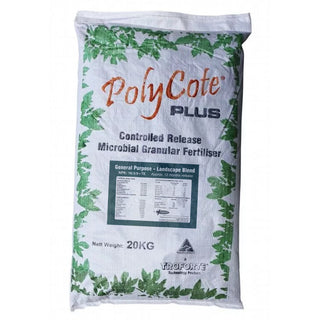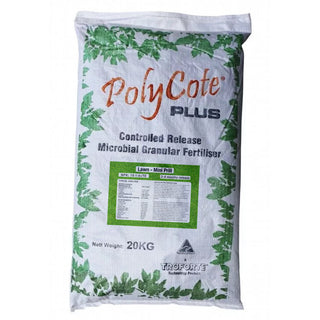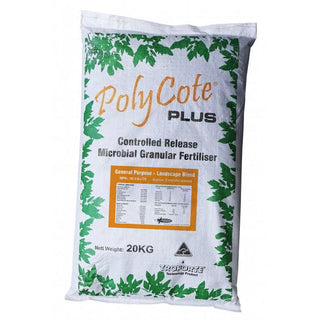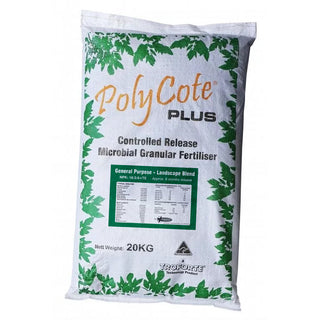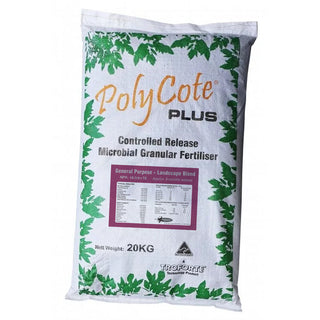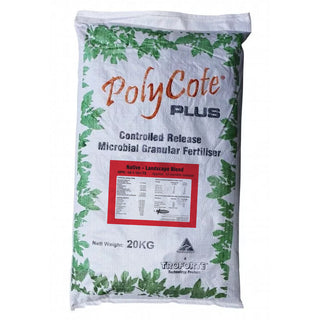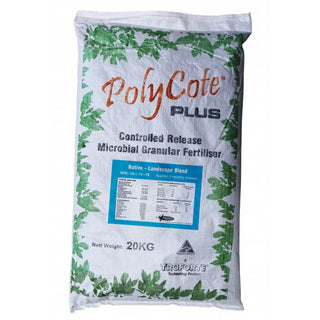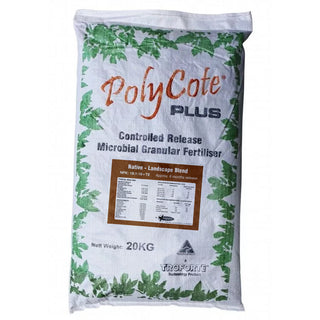Polymer-coated controlled-release fertilisers, such as our PolyCote Plus range, can maintain excellent product quality during a long storage period. We base the polymer-coated controlled-release fertiliser's mechanism on the polymer coating's hydrolysis. Liquid (water) diffuses into the fertiliser granules, causing the layer to swell, crack and eventually disintegrate.
Polymers are macromolecules synthesised by linking two or more simple molecules, often using covalent bonds.
Polyurea polymers have been developed as coating materials for agricultural products. Like an example, fertilisers; we can tailor them to give specific properties based on demand, including controlled release and enhanced nutrient, as it is released and absorbed into the soil or the root zone (such as crops).
The PolyCote Plus General Purpose
The PolyCote Plus fertilisers are available in a range of formulations, General Purpose, Native and Lawn Mini Prill. General Purpose fertilisers contain all the essential nutrients your plant requires at the right time of year to maximise growth potential.
Some of the chemical entity in this product would be:
Urea, Monoammonium phosphate, Ammonium Sulphate, Ammonium Nitrate, Potassium Sulphate, Potassium Nitrate, Magnesium Oxide, Ferrous Sulphate, Manganese Sulphate, Copper Sulphate, Zinc Oxide, Sodium Borate, Sodium Molybdate, Paraffin Wax, and naturally occurring non-hazardous mineral ingredients plus beneficial soil microbes.
The PolyCote Plus Native
PolyCote Plus Native fertilisers have great benefits for native plants or shrubs that prefer slower release of nutrients. The product also has excellent weed control properties. It is ideal for use around garden, turf, lawn, even potting mix. PolyCote Plus Native also has low phosphorus; as some of native plant species cannot handle too much of it. The rate in the product is below 2%.
We designed The Lawn Mini Prill variation to provide long-term feeding, so your lawn looking its best throughout summer into autumn when rain is less frequent than in early spring and winter. Not only PolyCote Plus controlled-release fertilisers are high-quality, but they also help with your watering system.
These products also carry sulphur, which aids plant growth and increases protein content, chlorophyll production, and nitrogen absorption. In plants, sulphur serves many functions. It is used in the formation of amino acids, proteins, and oils. It is a structural component of two of the 21 amino acids that form protein and helps activate certain enzymes. Sulphur is also necessary for chlorophyll formation, nodulation in legumes, and helps develop plant immunity against diseases.
Getting to know the Troforte Microbiological technology
Troforte Microbiological Technology is essentially based on a natural balance of minerals, microbes and mulch (organic matter) in the soil. It balances chemical fertilisers and enables them to be used to provide optimal nutrient availability for the crop. The result is a healthy plant that is naturally drought-resistant, disease-free and pest-resistant.
Australian cultured beneficial (probiotic) microorganisms enhances Troforte Microbial Technology. They allow bacteria to interact synergistically. It provides bio-available mineral nutrients through microbial activities on the "natural" ores. It is removing growth inhibitory substances from soils, and stimulating biochemical activities that enhance overall plant physiology like nitrogen fixation.
Other benefits of PolyCote Controlled Release Fertilisers
Other benefits of PolyCote Plus fertilisers are that the unique coating results in high-performance release characteristics at both low and high temperatures. In such a small amount, the coated controlled-release fertiliser releases chemicals such as Nitrogen, Phosphorus, Potassium and trace elements in relative proportion to their ratios in the granule. The Troforte Microbiological technology provides up to 24 beneficial Australian soil microbes strains. These microbes (microbial activity) enormously influence the feeding process, enhancing growing medium and plant health and plant-soil interactions in the take-up of nutrition.
We conducted the hydro-thermal ageing tests by immersing fertiliser samples in boiling water. Temperature, environmental conditions, relative humidity and soil pH affect the degradation of polymer coatings. The solubility of the polymer coating decreases over time. Which is why General Purpose and Native fertilisers are available in 3, 6, 9, and 12 months (slow-release fertiliser), while Lawn Mini Prill is available for 3-4 months release. In other words, PolyCote Plus fertilisers can control the release rates. Imagine a powerful fertiliser range, only less risk and more brilliant!
Leaching is the process of removing soluble compounds from a solid form and making them into a liquid. We can apply the leaching method in many different ways. In plant life, soil, decomposition of organic materials, or even disposal of hazardous waste products. Understanding leaching is crucial because it can affect water quality and contamination removal and disposal. It would also be good to know that leaching of nutrients could happen in soils due to over-fertilising. Controlled-release fertilisers could help avoid.
"The most commonly used nitrogen and phosphorus fertilisers in the high rainfall south-west of Western Australia can be leached into the groundwater and washed into waterways, resulting in serious environmental and economic damage."


